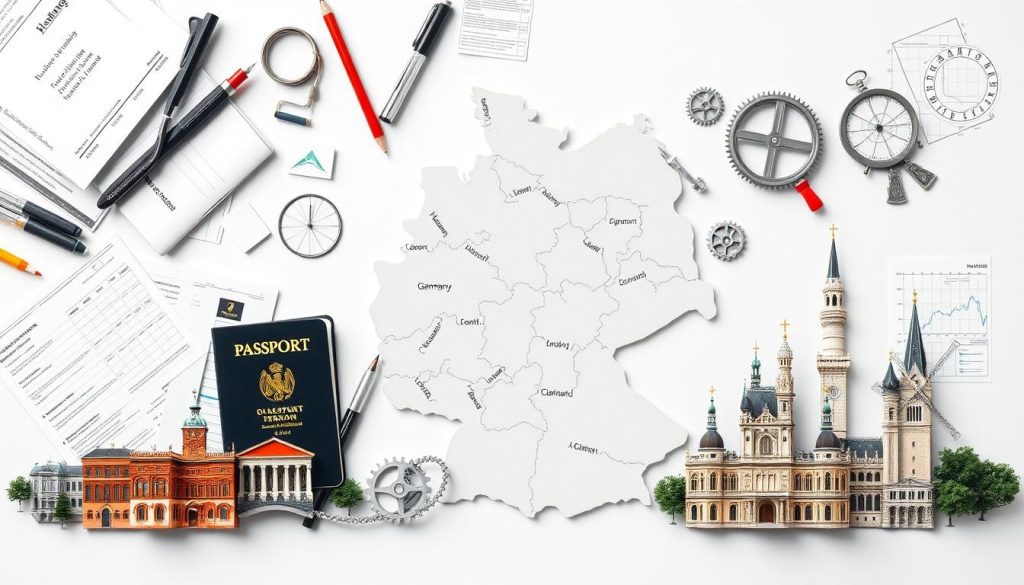Are you contemplating the relocation of your business to Germany? This country presents a plethora of opportunities for enterprises seeking to broaden their scope. Its formidable economy, pivotal geographical position at Europe’s core, and a workforce of unparalleled calibre make Germany an enticing locale for business relocation. Grasping the complexities of the German market is paramount for a seamless transition. Our objective is to furnish you with indispensable insights into the advantages and considerations of transferring your business operations to Germany.
- Understanding the German Business Landscape
- Benefits of Expanding Business to Germany
- Relocating to Germany for business
- Legal Requirements for Business Relocation
- Setting Up Your Company in Germany
- Cost of Living and Operating Costs
- Cultural Considerations in German Business
- Finding the Right Talent in Germany
- Resources for Settling in Germany for Business
- Navigating the Language Barrier
- Relocation Services and Support
- Establishing a Work-Life Balance in Germany
- Exploring Business Opportunities in Germany
Understanding the German Business Landscape
The Germany business landscape presents a plethora of opportunities for those aspiring to expand or initiate their ventures. Renowned for its robust economy, Germany emerges as one of the most significant in Europe, drawing innumerable international enterprises. A pivotal aspect in comprehending the German market lies in identifying the principal sectors that propel its prosperity.

Germany’s economy is distinguished by its varied industries, encompassing:
- Automotive
- Engineering
- Technology
- Finance
Each sector offers distinct business prospects in Germany, addressing diverse consumer needs and industry trends. Grasping regional disparities is essential. For example, Bavaria is celebrated for its automotive sector, while Berlin is a hub for technology. Delving into these local specifics is vital for crafting bespoke business strategies.
The regulatory framework significantly influences the Germany business landscape. Adherence to local laws and regulations is imperative for smooth operations and stakeholder trust. Businesses must adeptly navigate these requirements to lay a firm groundwork in the market.
In conclusion, gaining insight into the Germany business landscape equips entrepreneurs and investors with the capability to discern and capitalise on business opportunities in Germany with precision.
Benefits of Expanding Business to Germany
The decision to expand your business to Germany is met with a plethora of advantages, significantly bolstering your operational prowess. The country’s robust economic framework stands as a beacon, drawing in foreign investments and offering a steadfast foundation for growth. This stability is a cornerstone, underpinning the allure of Germany as a destination for business expansion.
Germany’s vast consumer market, replete with diversity, presents a treasure trove of business opportunities. Its strategic location at the heart of Europe further enhances these prospects, positioning it as a prime locale for companies aspiring to broaden their market presence.
The availability of a highly skilled workforce, complemented by Germany’s dedication to research and development, is another significant draw. By relocating to Germany, businesses can tap into this talent reservoir, fostering innovation and ensuring market competitiveness.
Moreover, Germany’s political stability and favourable business regulations create a welcoming environment for international enterprises. These factors collectively ensure a conducive setting for entrepreneurs, rendering the expansion to Germany an attractive proposition for those in pursuit of growth.

Relocating to Germany for business
Considering relocation to Germany for business necessitates a thorough comprehension of the country’s industrial landscape. Germany’s economy is bolstered by a multitude of sectors, each presenting substantial opportunities for expansion. The most prominent industries are particularly noteworthy for their potential to drive business success.
Key Industries to Consider
The automotive sector in Germany stands out, with Volkswagen and BMW leading the charge. This industry is synonymous with innovation and engineering prowess. Machinery and equipment manufacturing also hold a pivotal position, thanks to Germany’s global reputation for producing high-quality machinery.
The chemical industry, spearheaded by BASF, is another cornerstone of Germany’s economy. It encompasses a broad spectrum, from pharmaceuticals to specialty chemicals, significantly bolstering the country’s economic standing. The burgeoning information technology sector, propelled by advancements in digitalisation and cloud computing, further underscores Germany’s economic dynamism.
Market Trends and Insights
For businesses contemplating relocation to Germany, staying abreast of market trends is crucial. A significant trend is the growing emphasis on sustainability, which influences consumer behaviour and business strategies across multiple sectors. Digital transformation is also reshaping the market, demanding updates in operational processes and customer engagement.
Globalisation’s impact on local markets presents both challenges and opportunities for businesses. Grasping these trends enables companies to fine-tune their strategies, ensuring a successful foray into the German market.

Legal Requirements for Business Relocation
Embarking on a business relocation to Germany necessitates a thorough understanding of the legal framework. The process of business registration is complex, requiring meticulous adherence to local regulations. This involves a series of steps designed to ensure compliance with the law.
Business Registration Process
The initial step in the business registration process in Germany is the submission of necessary documents to the Gewerbeamt, the local trade office. This is a critical phase, as it facilitates the acquisition of the requisite permits and licenses for lawful operation.
- Prepare your business plan, detailing your operations, target market, and financial projections.
- Gather required documents, including identification, proof of address, and any relevant qualifications.
- Complete the registration application form provided by the Gewerbeamt.
- Submit your application and pay the associated fees.
Upon Gewerbeamt approval, businesses must register with the Finanzamt for tax purposes. This entails providing information on the business type and expected revenue. A comprehensive understanding of these legal requirements is paramount to navigating the relocation process successfully.

Setting Up Your Company in Germany
Embarking on the journey to establish a business in Germany necessitates a profound comprehension of the diverse facets involved. This includes a thorough examination of the myriad business entities available and the strategic selection of a business location within Germany. Each entity possesses unique attributes, tailored to meet the specific requirements of various enterprises. Concurrently, certain cities within Germany are renowned for their ability to foster specific industry sectors, thereby offering unique opportunities for business growth.
Types of Business Entities
The selection of an appropriate business entity is paramount when contemplating the establishment of a company in Germany. The two predominant forms are:
- GmbH (Gesellschaft mit beschränkter Haftung): A limited liability company, distinguished by its provision of personal liability protection to its proprietors. It mandates a minimum capital requirement of €25,000, with a stipulation that at least half of this amount must be contributed at the time of registration.
- AG (Aktiengesellschaft): This public limited company facilitates the trading of shares on the public market and necessitates a minimum capital of €50,000. It is particularly advantageous for larger corporations seeking substantial investments.
Each entity possesses its own set of advantages and disadvantages. The GmbH is generally more manageable and is well-suited for small to medium-sized enterprises. Conversely, the AG is more appropriate for larger organisations that require substantial capital.
Choosing the Right Location
The selection of a strategic business location within Germany is of paramount importance for the success of any operation. Major urban centres such as Berlin, Munich, and Frankfurt offer a plethora of benefits. Key considerations include:
- Industry Clusters: Cities like Munich are celebrated for their technological prowess and innovation, while Frankfurt’s status as a financial hub provides invaluable networks for businesses focused on finance.
- Market Access: The proximity to both customers and suppliers significantly impacts market reach. Urban areas generally offer superior access to larger consumer markets.
- Infrastructure: An evaluation of transport links, telecommunications services, and support infrastructure is crucial to ensure seamless operations.
Opting for the correct business location in Germany can significantly enhance visibility, connectivity, and ultimately, business expansion.

Cost of Living and Operating Costs
Relocating a business to Germany necessitates a thorough comprehension of the cost of living and operational expenses. These costs fluctuate significantly across different cities, influencing both the financial planning and the venture’s viability. It is imperative for businesses to adeptly navigate these expenses to guarantee sustainable operations.
Understanding Taxes and Duties
The financial landscape of businesses in Germany is heavily influenced by taxes and duties. This includes corporate tax, value-added tax (VAT), and local trade taxes. Each region imposes its own set of regulations and rates, necessitating meticulous consideration when formulating operating budgets. Acquaintance with Germany’s tax framework is essential for optimising financial strategies.
Operational Expenses in Germany
Operational expenses in Germany comprise a multitude of elements, such as rental costs, employee remuneration, and utility expenditures. Cities like Berlin and Munich exhibit distinct cost profiles, influencing the choice of location for businesses. Grasping these variations is crucial for identifying optimal locations and managing overheads effectively.

Cultural Considerations in German Business
Engagement with the cultural milieu is paramount for any enterprise seeking success in Germany. Grasping the nuances of cultural considerations within Germany can profoundly augment your engagement and efficacy in the market. Acquaintance with local customs and practices fosters more robust relationships and facilitates smoother interactions.
Understanding Business Etiquette
Business etiquette in Germany is marked by a pronounced emphasis on punctuality, direct communication, and professionalism. Adherence to punctuality in meetings and appointments is viewed as a cornerstone of respect, embodying reliability and gravity. It is prudent to meticulously plan your schedule, ensuring punctual arrival.
Furthermore, Germans value direct and unambiguous communication. Indirect speech can engender confusion and may be interpreted as evasive. Engage in discussions with clarity, articulating your points succinctly. This approach not only conveys respect but also cultivates trust and openness.
Adherence to professional standards in all interactions is equally imperative. Business meetings generally demand formal attire, particularly in traditional sectors. Comprehension of this professional ethos is essential for relationship-building. A firm handshake and sustained eye contact are customary greetings that signify confidence and sincerity.
By prioritising these cultural considerations in Germany, foreign enterprises will be better positioned to navigate the intricate yet lucrative German business terrain.

Finding the Right Talent in Germany
To attract and retain elite talent within Germany’s competitive job market, a meticulous strategy is imperative. Grasping the nuances of recruitment in Germany is critical for enterprises seeking to construct a proficient workforce. It is paramount for companies to cultivate an employer brand that captivates potential candidates.

- Utilising local recruitment agencies with expertise in the German job market
- Engaging in employer branding initiatives to communicate company culture and values
- Providing clear paths for career development and professional growth
Moreover, aligning with employees’ aspirations for a harmonious work-life balance and welfare is crucial. Implementing flexible working schedules and fostering employee wellbeing can significantly bolster a company’s allure. Such measures will undoubtedly attract a workforce that is more engaged and committed.
Resources for Settling in Germany for Business
The decision to relocate your business to Germany heralds a plethora of opportunities, with the right resources proving pivotal. Access to resources for settling in Germany can expedite your transition, thereby amplifying your prospects for success. Engaging in networking in Germany is essential for forging connections and establishing a support network. Additionally, understanding the array of government resources available to businesses can offer indispensable guidance and support.
Networking Opportunities
Establishing a robust network is paramount for any business venture. In Germany, numerous industry associations and business fairs provide ample opportunities for networking. Attend events such as:
- Trade shows to meet potential partners and clients
- Local business meet-ups to connect with other entrepreneurs
- Workshops and seminars hosted by industry experts
These gatherings not only increase your visibility but also offer valuable insights into market trends and industry standards.
Government and Non-Government Resources
Utilising government resources for businesses can significantly ease the relocation process. Various agencies offer substantial support, including:
- Chambers of commerce that provide advice tailored to individual business needs
- Government-backed programmes that assist with funding and grants
- Networking platforms with local business communities
Furthermore, consider leveraging local private organisations that offer mentorship and business development opportunities. Integrating these resources into your relocation strategy can substantially enhance your business operations in Germany.

Navigating the Language Barrier
The transition to Germany introduces unique linguistic hurdles for enterprises. Although a considerable number of Germans possess English fluency, the acquisition of German significantly augments dialogue and rapport. This is notably pertinent in contexts involving contractual agreements, negotiations, and the subtleties of the local market.

For enterprises to thrive, overcoming the language barrier in Germany is imperative. The recruitment of personnel conversant in both languages facilitates communication and augments collaboration with indigenous partners and clientele. Furthermore, the provision of language training for employees cultivates an environment of inclusivity and signifies a dedication to assimilation into the local community.
When German proficiency is lacking, the recourse to translation services can prevent misinterpretations. These services are instrumental in the creation of marketing materials, legal documents, and customer communications, thereby ensuring the dissemination of a company’s message to a broader demographic.
- Invest in language training for employees to facilitate smoother interactions.
- Hire bilingual staff to strengthen communication with local clients.
- Consider professional translation services for important business documents.
By addressing the linguistic challenges faced by businesses, a smoother integration into the German market is achieved. This not only enhances operational efficiency but also fosters trust with local stakeholders.
Relocation Services and Support
The act of relocating to a new country, particularly for business professionals, presents a formidable challenge. It necessitates a deep understanding of the complexities inherent in the new environment. Engaging with relocation services in Germany offers manifold advantages. These services provide bespoke support, streamlining the relocation process. This enables entrepreneurs to concentrate on their primary business objectives.
Hiring Relocation Experts
The engagement of relocation experts can profoundly enhance your transition experience. These specialists are adept at mitigating the challenges associated with relocation. They offer indispensable assistance with critical tasks, including:
- Understanding local laws and regulations
- Managing paperwork for visas and permits
- Arranging housing and local services
- Offering cultural orientation and language training
Through their expertise, these relocation services in Germany are instrumental in facilitating a seamless integration into your new surroundings. By mitigating administrative burdens, the engagement of relocation experts empowers you to channel your energies towards the establishment and expansion of your business.

Establishing a Work-Life Balance in Germany
In Germany, the significance of a robust work-life balance is paramount. This cultural emphasis underscores a deeper commitment to employee welfare, rendering it crucial for enterprises seeking to flourish. German corporations frequently adopt flexible working schedules and extensive parental leave provisions. These measures are designed to facilitate a harmonious equilibrium between professional and personal spheres.
The cultivation of a supportive workplace ethos reaps substantial advantages. Entities prioritising work-life balance typically observe:
- Augmented employee contentment
- Superior retention metrics
- Heightened productivity
Adopting such principles not only fosters employee well-being in Germany but also engenders a more dedicated workforce. This, in turn, contributes to sustained organisational success. Acknowledging the cultural significance of balance, entrepreneurs must consider these practices when strategising their operations within Germany.

Exploring Business Opportunities in Germany
Germany’s economic landscape is a mosaic of burgeoning sectors, notably renewable energy, fintech, and e-commerce. As a pivotal player in Europe’s economic sphere, the market potential within Germany is vast, offering fertile ground for innovation and expansion across multiple industries. The infrastructure, a highly skilled workforce, and a supportive regulatory environment collectively create a dynamic business ecosystem.
The renewable energy sector, spearheading Germany’s commitment to sustainability, is on the cusp of significant growth. This presents a critical opportunity for enterprises dedicated to environmental responsibility. Concurrently, the fintech sector is undergoing rapid transformation, driven by technological innovation and shifting consumer preferences. This evolution opens up substantial opportunities for new entrants in the market.
E-commerce has witnessed a meteoric rise, capitalising on the global shift towards online retail. Businesses capitalising on this trend can access a broad customer base, enhancing their growth prospects. Acknowledging these opportunities in Germany equips companies with the necessary tools for innovation, positioning them advantageously in a competitive arena, ensuring enduring success and sustainability.

